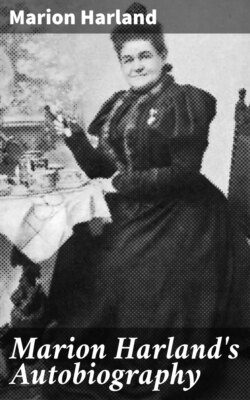Читать книгу Marion Harland's Autobiography - Marion Harland - Страница 6
На сайте Литреса книга снята с продажи.
Оглавление“We are going on bravely with our subscription for building a meeting-house. Yesterday was the first of my turning out with subscription-paper. I got 162 dollars subscribed, with a promise of more. We have now about 1800 dollars on our subscription-list, which sum increases at least 100 dollars a day. I hope, with a little help that we have reason to expect from New York, we shall soon be able to begin the work, which may the Lord prosper in our hands!”
The “meeting-house,” when constructed, was popularly known as the “Pineapple Church,” from the conical ornament topping the steeple. As Richmond grew westward and climbed up Shockoe Hill, the First Presbyterian Church was swept up with the congregation to another site. The deserted building was bought by the Episcopalians, and christened “Christ Church.” As long as it stood it was known by the “old-timers” as the “Old Pineapple.”
The daughters of Captain Sterling’s first wife were Mary and Elizabeth (the “Betsy” of his letters). She married Rev. Thomas Lumpkin, whom she met on one of her visits to Prince Edward County, where her aunt, Mrs. James Morton, lived in the vicinity of Hampden Sidney College. Her husband lived but seven months from the wedding-day, and she returned to Olney and the fostering care of her father and the second mother, who was ever her fast and tender friend. There, in the house where she was born, she laid in her stepmother’s arms a baby-girl, born four months later. The posthumous child became the beloved “Cousin Mary” of these memoirs. She had been the petted darling of the homestead five years when her mother married again, and another clergyman, whom I shall call “Mr. Carus.” He was a Connecticut man who had been a tutor in the Olney household before he took orders. For reasons which will appear by-and-by, I prefer to disguise his name. Others in his native New England bear it, although he left no descendants.
From my mother I had the particulars of the death-scene in that first-floor “chamber” in the homestead, when, on a sultry August day (1820), “the longest, saddest day I have ever known”—said the daughter—the dainty, delicate creature who was soul and heart to the home passed away from earth.
My mother has told me how the scent of white jessamine flowed into the room where grief was hushed to hearken for the failing breath.
Dr. Rice’s niece leaned over the pillow in which the girl of fourteen smothered her sobs in clinging to the small hand so strangely cold.
“She does not breathe!” the weeper heard the friend whisper. And in a moment more, “Her heart does not beat!”
I have dwelt at length upon the character and life of my maternal grandmother because of my solemn conviction that I inherit what humble talent is mine from her. I cannot recall the time when everything connected with her did not possess for me a sweet and weird charm; when the fancy that this petite woman, with a heart and soul too great for her physique, was my guardian angel, did not stay my soul and renew my courage in all good emprises.
Her profiled portrait hangs before me as I write. The features are finely chiselled and high-bred; the expression is sweet. She wears a close cap with a lace border (she was but fifty-three at death!), and a crimped frill stands up about a slender neck.
My fantasy may be a figment of the imagination. I cherish it with a tenacity that tells me it is more. That my mother shared it was proved by her legacy to me of all the books and other relics of her mother she possessed at the time of her own decease, and the richer legacy of tales of that mother’s life and words, her deeds of mercy and love, which cannot but make me a better woman.
The mortal remains of my patron saint lie in the old family burying-ground. War, in its rudest shape, swept over the ancestral acres for two years. Trees, centuries old, were cut down; ruffian soldiery camped upon and tramped over desolated fields; outbuildings were destroyed, and the cosey home stripped of porches and wings, leaving it a pitiful shell. Captain Sterling had fought at Germantown and Monmouth, leading his Henrico troopers in the train of Washington and Gates. And Northern cannon and Southern musketry jarred his bones after their rest of half a century in the country graveyard!
Yet—and this I like to think of—the periwinkle that opens its blue eyes in the early springtime, and the long-stemmed narcissus, waving its golden censers above the tangled grasses, spring from the roots her dear hands buried there one hundred years ago.
